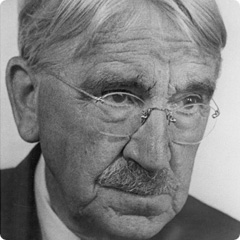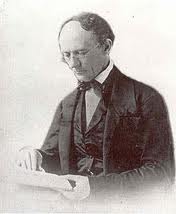IPFS

Words Eye View
Greg J Dixon
More About: Religion: BelieversThe Generation Gap: Part VII - John Dewey
This is the seventh in this series based on the Georgia Guidelines, the gigantic New Age Monument in Elbert, County, Georgia, that has engraved upon it the ten commandments of the New World Order. We are also showing how the men who financed this monument have the same agenda as did the seven men who still rule the world from their grave that Dave Breese has shined the spotlight on, in his outstanding book by that name, (Moody Press - 1990). In this edition of Freedom's Phoenix we deal with the fifth of these "wolves in sheep's clothing", – John Dewey, known as the "Father of modern education."

John Dewey
As most of these men, Dewey would have never been picked to be one of those who "changed the world". He was born in Burlington, Vermont in 1859. Bookish and shy and never thought to be brilliant, he enrolled in the University of Vermont in 1875 with no clear idea as to his life's goals. According to biographers, while there, he became interested in philosophy with a special turn toward social thought, however, from the beginning he didn't see philosophy from a classical point of view. As it is normally taught, it deals with the great questions of life, and teaches that an answer to those questions is embraced by one school of thought or another. For Dewey, philosophy was not so easily categorized, rather, he saw man as living in the midst of a swirling set of ideas, issues, concerns, and problems, which set was ever changing. So those problems needed to be considered in the light of ever changing developments. Nothing must be thought of as settled or foundational. Hence fundamental or fundamentalism was a bad word in any discipline, whether philosophy, science, religion, or morals. Here is where we get the first glimpse of the idea of "situation ethics."
It wasn't long until he discovered Hegel and Hegelianism which also influenced Marx, Darwin, Kierkegaard and all the other new thinkers or stinkers. In other words reality is never fixed.
The early John Dewey was involved in specifics because he taught science and algebra on a high school level in Oil City, Pennsylvania, from 1879-81 before returning to Vermont where he continued to teach. He took his doctorate at Johns Hopkins in 1884, presenting his thesis on the psychology of Immanuel Kant. He had written his first two books on psychology by 1889 and then moved on to the University of Chicago where he became chairman of the Dept. of Philosophy, Psychology, and Education. He took part in social projects in Chicago pertaining to the poor. He founded the laboratory school which became known as The Dewey School and wrote a number of books on education, such as The School and Society and The Child and the Curriculum. He was then invited to assume the chair of education at Columbia University in New York where he stayed until he retired in 1930 where he gained international prominence for his radical views in education and philosophy. The Columbia Teachers' College became a training center for teachers from around the world, thereby spreading Dewey's educational philosophy literally to the ends of the earth.
Dewey believed that "Schools…have a role in production of social change," which he believed was constant in society and anyone who did not recognize this point was under "a self-imposed hallucination." His position on religion was made clear with the statement that he rejoices in "the greatest intellectual readjustment history records," a readjustment in which society and education moved from the supernatural to the non-supernatural? Statements like this should make taking prayer and Bible reading out of the schools, come more into focus. He was also Anti-democratic. He was near utopian in his attitude about the progress of history, according to Brees. Brees gives the following summary of his ideas in which he has influenced the world from his grave.
1. "Final Truth is illusory." The world is ever changing and the only constant is change therefore there is no such thing as "eternal truth." When you take this position then this philosophy begins with people and ends with people which is circular thinking and nowhere anchored in final truth. In reality, this is insanity. Any truth that does not begin with God and end with God drives men insane. Ask Belshazzar.
2. "Meaning is more important than Truth." In other words there is nothing tangible in the world that brings stability and certainty to life. It is whatever a word or concept "means" to the individual at the time. Again this leads to utter confusion.
3. The third so called principle is that Truth is "resident in experience." Therefore truth is totally subjective. This is where this whole idea of "if it feels good do it" came from. And, it must be right because I "feel" like its right. There is nothing to anchor our anchor to except our feelings. The "if the Spirit moves you" movement is based on the same concept. But even the Holy Spirit doesn't lead contrary to the Word of God. The Psalmist declares that God magnifies His Word above Himself. (Ps 138:2).
Of course if we are going to equate truth with experience we must ask, whose experience, and what experience are we going to use as a yard stick? And if we are going to use truth as the yardstick we must ask, whose truth?
There was a time in America that the educational system was based on God's truth as revealed on the Holy Scriptures. But that changed when the Dewey system was adopted for the three principles above and we have been adrift ever since. This is the reason that the Supreme Court had to outlaw prayer and Bible reading out of public education officially in two landmark cases in 1962 and 1963 because they could not have theism and atheism both as the foundation of our school system. One had to go, so they tossed God.
Raymond L. Shideler has laid this whole issue out in an extremely lucid manner in two of his Provocateur Newsletters dated Feb. and June (2013) as follows.
"The conceptual and moral foundation upon which colonial and early America was founded was Biblical and Christian. Nowhere is this more clearly shown than by the readers used in the early elementary schools. In 1837 the first McGuffey readers were published and became the most widely used reading books ever used in our school systems. Besides reading they promoted civility, good manners, and responsible behavior. They were used well into the 20th century. During the same year the popular McGuffey readers were published, the humanists began their program of secularization via educational centralization and promotion of humanistic philosophy by the person of Horace Mann. From 1838 to 1845, Mann, with the aid of many powerful Unitarian colleagues in Massachusetts, was able to establish a number of "normal schools" for the training of that state's public school teachers. These were copied in other states, and it was not long before each state exercised much more control over education of virtually all its children through state universities and teacher's colleges. The formation of teachers' associations in the states led in 1857 to the establishment of the National Educational Association (NEA) which has now become the most powerful union in the country.
Through the state of Massachusetts and particularly Harvard University , along with the influence of Mann and later his disciples, like Dewey and others, their philosophy has permeated public education ever since. Its beginning was influenced by the Prussian school system with its Hegelian philosophy, which Horace Mann studied and believed, and which promoted the ideas of centralized government. "
In His June Newsletter Mr. Shideler gives more detail about McGuffey and what was actually in his readers which, in light of the present culture should cause quite a shock.

William McGuffey
William Holmes McGuffey (1800-1873), an American educator was the President of Ohio University, professor at the University of Virginia, and the department chairman at the Miami University of Ohio. He was considered the "Schoolmaster of the Nation." He published his first edition of McGuffey's readers in 1836. In its forward the children learned:
"The Christian religion is the religion of our country. From it are derived our prevalent notions of the character of God, the great moral governor of the Universe. On its doctrines are founded the peculiarities of our free institutions. The Ten Commandments and the teachings of Jesus are not only basis but plenary.
Lesson 37 Evening Prayer – "At the close of the day, before you go to sleep, you should not fail to pray to God to keep you from sin and from harm, etc."
Lesson 62 Don't Take Strong Drink – "No little boy or girl should ever drink rum or whiskey, unless they want to become drunkards…"
Lesson 21 The Character of Jesus Christ is Taught – The morality taught by Jesus Christ was purer, sounder, sublimer, and more perfect than had ever before entered into the imagination, or proceeded from the lips of man…"
On Aug. 7, 1873, in Elmira, N.Y. the National Education Assoc. honored McGuffey at his death with a beautiful resolution. Among other things they said, "…his conscientious Christian character…all these have made him one of the nobles ornaments of our profession in this age, and entitled to the grateful remembrance of this Association and of the teachers of America."
And then Shideler asks, "We wonder what McGuffey would think if he could come back today and know that teachers are being fired because they dare bring their Bibles into the classroom."
Yes the generation gap has been produced by men that speak from their graves, and tragically the voice of the wicked are more powerful than the voice of the righteous, because weeds are more powerful than flowers. But in the resurrection the flowers will bloom again, and McGuffey will reign with Jesus in His Kingdom, and Dewey will be with Satan in the eternal Lake of Fire which was prepared for him and his angels before the foundations of the world, unless he repented and received the Lord Jesus as his savior before he died, for which we trust that he did.
Dr. Dixon was a pastor for nearly fifty years until he retired from the active pastorate. He is now the National Director of the Biblical Law Center http://biblicallawcenter.com/.
If you wish to receive this series as an e-book, send your e mail address to drgregdixon@earthlink.net.
If you would like to subscribe to our daily Trumpet on line please go to www.the-trumpet-online.com, then click on to the second page and follow the instructions.
For the quarterly Trumpet magazine send your e mail address to drgregdixon@earthlink.net.
























